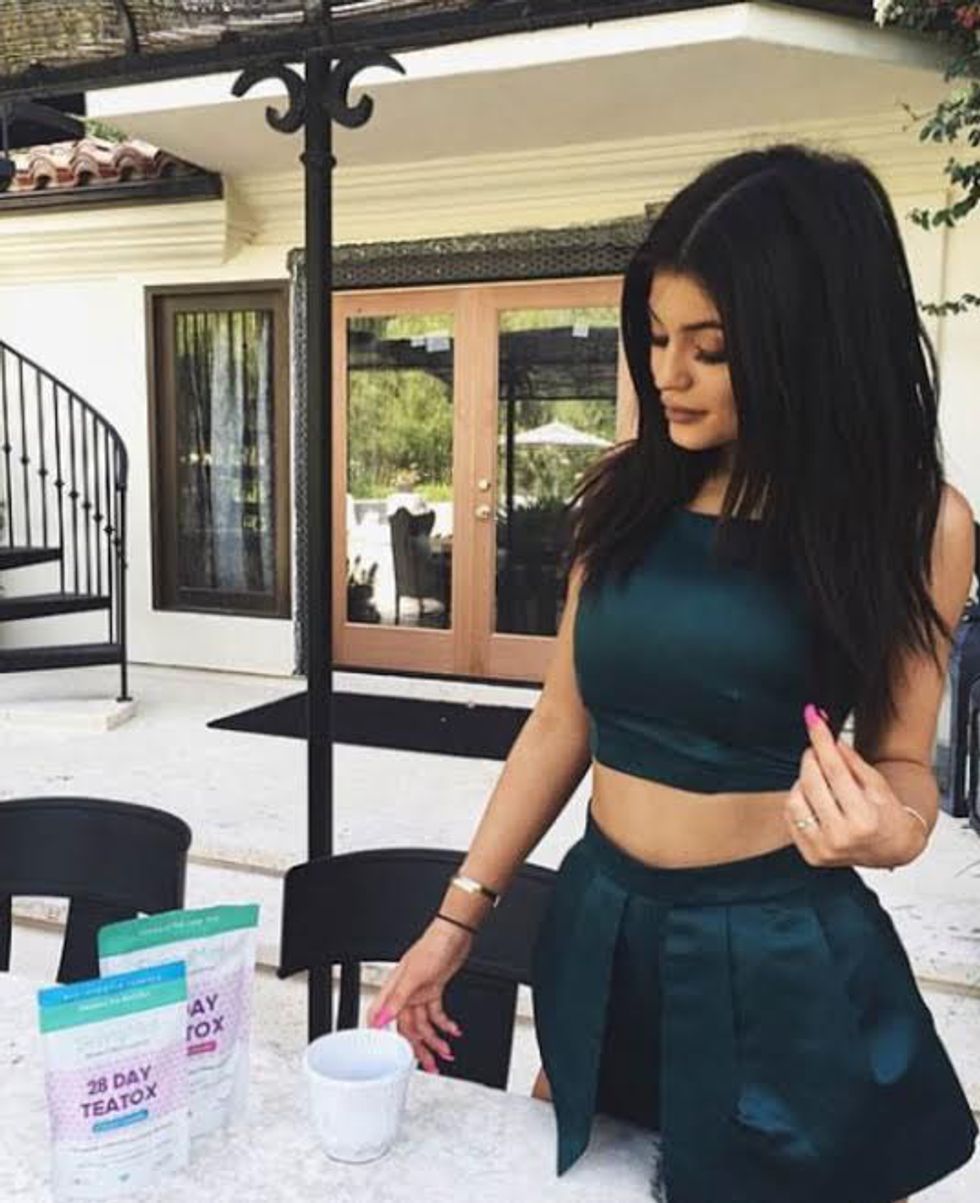Every once in a while, a new miracle product claiming to make all your fitness goals come true will pop up and it will be all the rave, with celebrities endorsing it and customers swearing by it. Usually, these products have some fancy name, claim to fix all your problems and are ridiculously expensive.
One such product that has taken social media by storm is SkinnyMint. SkinnyMint is a tea that you're supposed to drink for 28 days to "detox" your system - a so-called "TeaTox." Their "28 Day Ultimate Teatox" is priced at $54.90 and its advertising claims that the tea will help you lose weight. Celebrities such as Kylie Jenner have endorsed it through social media and this ad is circulating on Facebook:
This type of misleading advertising plays on women's self-esteem to make sales, and it's this type of advertising that makes health such a confusing concept to a lot of people. With so many products out there making promises right and left, it can be overwhelming and many might resort to desperate measures to feel good about themselves - often resulting in extreme and downright dangerous yo-yo dieting. In addition, the reason why the tea helps relieve bloating is that it contains diuretics and laxatives. I'm no doctor, but I'm not sure taking laxatives for 28 days straight is especially good for your body.
The celebrity endorsements don't make this much better - someone like Kylie Jenner typically has a large audience of young girls who are still in that phase of figuring out who they are and basing much of their self-worth on external factors.
The Facebook ad for SkinnyMint received several comments complaining about the nature of the ad and the misleading argument presented in it. The company later backtracked their argument, stating that "we do not claim that our product helps you lose weight. This is an effective and natural way to cleanse your body with our special 2 step tea detox program. Some customers lose weight and that is an added bonus."
However, a quick look at their website reveals that their marketing strategies very much revolve around the desire to lose weight and change one's physical appearance. They have an entire section of their website dedicated to before and after pictures of their customers, although if you actually read the reviews, most of them briefly mention that they also cleaned up their diet and started exercising multiple times a week (also known as an actually healthy lifestyle that will help change your body). From all this, one can gather that SkinnyMint's advertisement of their product is merely smoke and mirrors to prey on insecure women and sell products based on false hope.
While this unethical method of making sales probably does bring in money, it is certainly not the only way to be successful. Aerie, a lingerie brand under American Eagle Outfitters, has been commended for taking a vastly different approach to marketing to women. They, too, focus on body image, but they don't do it in the form of telling women they should lose weight as fast as possible - instead, they have taken a stance in the retouching debate and launched their #AerieReal campaign which features unretouched photos of women with various body types, from skinny and straight to curvy and plus size.
Earlier this year, Aerie featured model Barbie Ferreira on their site. Ferreira is plus size and definitely has a different body type than what is most commonly featured in lingerie ads.
More recently, British model Iskra Lawrence has been featured in Aerie's campaign. Lawrence is a size 14, and she looks undeniably healthy, debunking the myth that featuring plus size models is the same as promoting obesity and unhealthy habits.
Aerie offers a contrast to the lingerie brands dominating the market, such as Victoria's Secret. Victoria's Secret is notorious for featuring tall, skinny women, and this can be off-putting for women who don't fit into the stereotypical view of what is beautiful.
In 2016, consumers are more aware and proactive than ever. Increasingly, consumers buy products based on more than simply price and quality. The way a company is run, its focus on ethics (or lack thereof) and its contribution to the greater good are all factors that impact how willing consumers are to buy a product.
As times change, brands have to change with them. SkinnyMint is clinging to an outdated model of health marketing that does not promote actual healthy living at all. Instead, it banks on the notion that people who are desperate to lose weight will buy almost anything to achieve their “dream body” overnight without putting in any work.
Although marketing and advertising is ultimately about making sales, any brand with a large reach has a social responsibility to contribute to the greater good of society instead of taking away from it. Aerie has started to do this by showing women that their authentic bodies are good enough as is, and other brands need to follow suit if they want to keep up with the rapid wave of change.

























